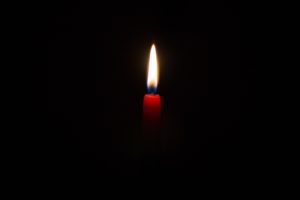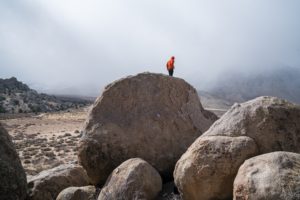by Jenny Rose | Nov 19, 2022 | A Flourishing Woman, The Journey
I was taught, as a child, it was my job to alleviate distress. One must always respond immediately and help the sufferer. It went far beyond duty and obligation. If I did not fix the distress of others, my childish world would fall apart. Everyone would leave.

Photo by Cristian Newman on Unsplash
For a child, such consequences are death.
I was also taught “help” meant doing anything and everything I was asked to do, immediately, unquestioningly, and unendingly. My own distress was of no consequence at best and a direct threat, an unwelcome competition, at worst.
That core teaching stayed with me as I grew up, and has been a keynote of my behavior and experience most of my life. I wanted to help people. When people around me suffered, I felt an overwhelming, painful panic, as well as complete responsibility. I had to do everything I could, give the situation my all in order to “help.”
I also grew up with an inability to respond to my own distress. Hunger, thirst, fatigue, emotional and physical pain, were all ignored. My disconnection from my own needs and experience led me into chronic pain, eating disorder, depression, and anxiety. I was unaware of my traumatic wounds. I had no interest in helping myself. Helping myself was selfish, bad, and unloving.
Then I studied emotional intelligence and all the work and therapy I’d done over the years with guides and teachers as well as on my own (see my Resources page) wove together into an intention to reclaim my health and my self.
This blog has been a key part of that work.
I still don’t like to watch people suffer, but I’m more careful now about “helping.” I’ve learned suffering is not necessarily the enemy. We get ill, have painful emotional and physical injuries, have uncomfortable feelings. We age and our bodies and sometimes our minds wear out. To be human is to experience these things; they’re inescapable. We can’t control what happens to us, but we can control how we deal with such events. When someone is suffering, I’ve learned to be less reactive, to remember it’s not my fault or my responsibility to fix it. I’ve learned to notice whether the sufferer is helping themselves before I jump in.

Photo by Joshua Earle on Unsplash
I have learned a bitter lesson: No one can help someone who will not help themselves.
I realize now we can’t always go back to where we were before we were wounded; we can’t always heal the wound itself. Sometimes our wounds and suffering are taking us into something new and what’s called for is not healing, but tolerance and patience.
What does “help” mean? This is an important question. Does help mean we respond promptly to all demands, whether or not they are safe, sustainable, or even possible? Does help mean we make thoughtful, intentional choices for safety and practicality even if those choices go against what we are being asked to do in terms of “help?” Do we decide what the best “help” is, or does the sufferer get to choose what kind of “help” they want?
I’m still uncomfortable talking about my own pain. Honestly, I’m still uncomfortable even noticing it, but I practice every day at staying present with how things are with me. It feels selfish and wrong, but I know that feeling doesn’t mean it is selfish and wrong, just that it’s very different from my early training. Sometimes the choice that feels worst is the best choice. Sometimes suffering is the only possible road forward into peace, growth and resilience.
None of us has the power to help anyone avoid suffering. I confess I’ve argued with that reality all my life, but it hasn’t done a bit of good. In fact, it’s done harm, most of all to myself.
I have occasionally, in the depths of anguish, asked for help. When I do that, what am I asking for?
Nothing tangible. Not money or a thing. Not love. Not sex. Not a gallon of ice cream. I’m not asking for someone to come along and fix it all, or take responsibility.
I’m asking to be heard. I’m asking for someone to say, “I’m here. You’re not alone. I believe in you. I know your goodness, your strength, your courage.” I’m asking for a safe place to discharge my feelings. This might involve snot, wet Kleenexes, rage, and a raised voice.
A safe place is not a place where someone else takes responsibility and fixes, or asks me to stop feeling my feelings, or is clearly uncomfortable with my suffering. A safe place is provided by someone with healthy boundaries who is willing to witness my distress without feeling compelled to fix it.
Witness. A witness. That’s ultimately what I want. Just someone to be there with me for a little while. I can face my own demons and challenges, but I can’t do it all alone.

Photo by Gemma Chua Tran on Unsplash
None of us can. We are social animals. But we can witness for one another. We can sit quietly, holding a safe space without judgment or a fix or advice, and just witness. Pass the Kleenex.
It’s the hardest thing in the world for me to do. Simply witnessing seems so passive, so weak, so useless. Someone right in front of me is deeply distressed and I simply sit like a bump on a log witnessing? Are you kidding me?
Surely, I can do better than that. I can do more than that. It’s up to me to make their suffering stop!
And yet. And yet. Isn’t finding a witness incredibly hard? How many people in our lives can take on such a role? What an inestimable gift, to be willing to walk beside someone who is suffering, to be willing to stay, to not look away. What if our boundaries were so healthy we could do that? What if we weren’t afraid of suffering? What if we were wise enough, strong enough, to make room for it and sit down beside it?
Someone I love is in great anguish of spirit. They beg me for help, but a very specific kind of help which is ethically and practically impossible for me or anyone else to give. Which makes me an enemy. Which makes my loved one even more alone than they already feel, more victimized, more powerless, more confused.
There is nothing about this that doesn’t suck. I dread the phone calls beyond words because I don’t want to witness this suffering. It feels unbearable. But my loved one must bear it, and if they have to, I can. I choose to witness. It feels like nothing. It’s not what’s wanted. But at this point it’s all I can do. So I will keep calling and answering calls. I will get up in the morning and talk to case managers, nurses, CNAs, palliative care consultants, nursing homes, and whoever else will talk to me. I will update friends and family. Then I will get up the next morning and do it again.
I pray there is some power in witnessing, some rightness. I pray that somehow my love and willingness to remain a witness does a little bit of good, provides some small comfort, lights a candle in the darkness of dementia, even for a moment.
And I search inside my own suffering for wisdom, for healing, for grace, and for faith.
To read my fiction, serially published free every week, go here:
by Jenny Rose | Nov 15, 2018 | Connection & Community, Emotional Intelligence
 We woke to a snowstorm this morning in central Maine. I could hardly wait to get out in it and walk. It was snowing hard and accumulating fast, coming down in heavy, wet flakes. I headed to work midmorning, maneuvering out of the driveway with some difficulty. The ground was already well saturated before this storm.
We woke to a snowstorm this morning in central Maine. I could hardly wait to get out in it and walk. It was snowing hard and accumulating fast, coming down in heavy, wet flakes. I headed to work midmorning, maneuvering out of the driveway with some difficulty. The ground was already well saturated before this storm.
Getting out of the driveway is the hardest part of winter driving here. I’ve been amazed at how well the roads are taken care of in Maine, much better than the rural roads and streets in Colorado. Still, winter driving is winter driving, and I gave myself plenty of time.
I quickly discovered the paved road was every bit as treacherous and without traction as the driveway. There was a heavy coating of slush and no sign of sanding or plowing. If I went over 30 miles an hour I lost traction and I almost couldn’t climb the steepest hill on the way into town. I turned on my audiobook, sipped my travel mug of tea, and settled down for a slow and careful commute, wondering why the road crews seemed to be ignoring the dangerous conditions.
 I started down a gently sloping hill with a shallow curve. One minute I was driving and the next I was floating. I was alone on the road. Nothing happened. I hadn’t accelerated or braked or jerked the wheel. I just started slipping across a thin layer of slush between the tires and the pavement, and I knew I wasn’t going to make the curve. I kept my feet off the pedals and tried to steer into the skid, but the tires might as well have been glass slippers, for all the traction they had.
I started down a gently sloping hill with a shallow curve. One minute I was driving and the next I was floating. I was alone on the road. Nothing happened. I hadn’t accelerated or braked or jerked the wheel. I just started slipping across a thin layer of slush between the tires and the pavement, and I knew I wasn’t going to make the curve. I kept my feet off the pedals and tried to steer into the skid, but the tires might as well have been glass slippers, for all the traction they had.
I was very lucky. The side of the road was thickly edged with woody shrubs like alder and willow. I didn’t hit a pole, tree or fence, and I wasn’t going fast. I also didn’t land in water, a real danger here in Maine. I recognized the weightless feeling in the pit of my stomach and knew I was helpless, a victim of momentum. All I could do was sit tight and wait for the car to stop. I wasn’t at all scared. I had a seatbelt on and I was only coasting.
I’m going to be late for work, I thought, resigned.
The brush and bushes caught me neatly. I turned off the audiobook and engine, turned on the hazard lights, gathered up my keys, wallet and travel mug of tea — not a drop had spilled — and set out for the nearest house.
I was greeted by the baying of several dogs, the alarm calls of a pair of geese and a woman about my own age with very blue eyes. I explained, said I didn’t have a cell phone, and asked if I could call for help.
She was extremely kind. The dogs were contained somewhere while I waited. The geese eyed me balefully. When I stepped inside, the house was warm and a stove glowing. It was a typical farmhouse kitchen, cluttered, friendly, comfortable, filled with plants. She handed me her cell phone, introduced herself as Sarah, and asked if I was hurt. I reassured her I was perfectly unharmed, called my partner and called work. I was about to call AAA when she offered to pull me out with her tractor.
I dithered. I have a horror of being a burden or needing help. Why should this woman leave her cozy kitchen and go out into the snow and slush to pull a stranger out of the ditch? She told me to stop apologizing and pointed out that AAA would likely take a long time to respond, given the local conditions. We both wore heavy mud/snow/rain boots. She flung on an old yellow slicker and fired up the tractor.
The tractor couldn’t get any traction, either. It churned up mounds of mud and grass, but the chain wasn’t long enough to allow it to pull from the pavement, and she came close to sliding sideways into the ditch, just as I had done.
At this point we’d both been lying on the slushy, muddy ground hooking up chains, the snow was coming down in wet clots, and the narrow rural road we were on was extremely hazardous. Sarah took the tractor back and returned with “Tank.” Tank is an old-fashioned heavy farm truck, painted in camo and looking indestructible.
Tank couldn’t pull me out, either.
 During all this, everyone who went by stopped to ask if we needed help.
During all this, everyone who went by stopped to ask if we needed help.
The snow turned to heavy rain.
We went back to the house and I called AAA.
I wanted to wait for the tow truck in the car, but Sarah wouldn’t hear of it. We could see the car from her kitchen window. We were both wet and muddy to the skin. We sat at the kitchen table and talked about our sons (her two and my two) and what we’d done with our lives so far. Every car that went by mine either slowed or stopped. We were so worried someone else would go off the road or my mishap would cause another accident, we put a note on the car window saying Nobody hurt. Waiting for tow truck.
About an hour later a big tow truck pulled up. I thanked Sarah from the bottom of my heart, put my sodden coat back on and went out into the pouring rain. There were two young guys in the truck. They considered the problem, walking around the car in their heavy boots and the bulky waterproof gear all the working men seem to wear here. They decided the only way to get me out was to pull me sideways back onto the road. I was shivering by that time. I got in the driver’s seat, rolled down the window (I could hardly have been wetter), and prepared to follow directions.
While they were working the road was effectively blocked. A big pickup truck came along, pulled into the center of the road behind the tow truck, and turned on his hazards.
They pulled this way and that. I went from neutral to park and back again. I braked when they told me to. The rain ran down my face and neck and under my coat and other clothing. Branches scraped across the car. The winch whined. Mud and slush churned. A few vehicles waited patiently. We finally got two tires on the road. They got behind me and told me to accelerate nice and slow. I did so, they pushed, and the tires found the pavement again.
I thanked them wholeheartedly. I waved to the kind and patient human being who blocked traffic and kept us all safe.
This morning in Maine there have been many, many accidents, including a flipped-over school bus, snowplows off the road, jackknifed trucks and people like me sliding into ditches, power poles and other cars. There have been cancellations, delays and detours. We are warned of flooding. This afternoon and tonight we expect freezing rain. The storm is not over, but my adventures for the day are. I crept back home three hours after I left it, shivering, wet and exhausted, and promptly got stuck in the driveway.
How do we thank the strangers who brush against our lives and lend a helping hand? I’ve never known. A simple thank you seems so wholly inadequate. Still, what else can I say? What about all those anonymous strangers who help in ways we never know about, or come and go so quickly we don’t even see their faces? As an old first responder, I know how essential traffic control is, but I don’t know if the driver who shielded us and stopped traffic was a man or woman. I suspect everyone’s plans were disrupted this morning, but people slowed and stopped to make sure the driver of the car in the ditch was not injured or needing help. Treacherous roads, blinding snow and then rain, a dark November day, and ordinary men and women willing to assist in spite of it, willing to leave their warm firesides and kitchens, willing to climb out of their dry, cozy vehicles, willing to do what they could for a stranger.
These are the darkest times I’ve seen in America in my lifetime, but this morning my faith in humanity was renewed. A series of strangers helped me when I was in need, and because of them I’m back home, safe, dry and warm. I’m grateful. I also know that all over the world people are practicing small acts of kindness all the time, ordinary people going about their business in neighborhoods, communities and at work. This post is for them.
Thank you for checking to make sure a stranded driver is okay. Thank you for answering a stranger’s knock at your door. Thank you for offering a cell phone or other means of communication to someone who is stuck without the ability to call for help. Thank you for helping direct or block traffic so further accidents don’t occur. Thank you for being patient when an accident holds you up. Thank you to all those first responders, tow truck drivers, utility company workers and the other hundreds of thousands who are there with tow chains, chainsaws, shovels and tractors when the unexpected happens. You might be doing your job, but thank you anyway for your smiles, your kindness, your expertise, your willingness to contribute, your difficult and often risky work, and your humanity.
My hope lies in all of us who do what we can in our little corner of the world. The simple, humble kindness of strangers may, in the end, save us.

Photo by David Monje on Unsplash
All content on this site ©2018
Jennifer Rose
except where otherwise noted
by Jenny Rose | Feb 2, 2017 | Contribution, Emotional Intelligence
This week’s post is suspended between two stories. The first one is the old Greek myth of Sisyphus.
Sisyphus was a crafty and deceitful king who craved complete power. In his pursuit of power, he offended many men and gods and was eventually punished by being sent to the underworld and forced to roll a huge boulder up a steep hill. The boulder was enchanted, however, to roll back down the hill (over Sisyphus, in some versions) just before it reached the top. Thus, Sisyphus was doomed to repeat the same unending and futile task forever.

Photo by Tommy Lisbin on Unsplash
Sisyphus has captured the imagination of many writers, philosophers and artists, and there are several variations and interpretations of his story. If you’re interested, you can follow the link to to Wiki and read more.
Sisyphus is on my mind this week, not only because his story suggests to me the inevitability of rising and falling cycles, but also because his punishment was to forever try and fail.
His punishment was to forever try.
Huh.

Photo by Casey Horner on Unsplash
I’m a product of a culture that taught me certain core truths about life. One has a responsibility to help others. Everyone has to do things they don’t want to do. One must never give up. One must try one’s best. We’re all in a train behind a little engine that puffs, “I think I can, I think I can, I think I can,” and that’s the right place to be, the admirable, ethical, moral, adult, acceptable, responsible, side-of-the-angels place to be. Good people try and try and try. They don’t despair, they don’t give up and they don’t say it’s too hard, I can’t or, most unforgiveable of all — I won’t.
No is not an option.
The truth is one of the things I least like about myself is that I can always be counted on to try my best. I don’t mean work hard. I mean try hard. Trying is certainly hard work. It’s sucked up most of my life in terms of time and energy. A lifetime of trying, though, has produced less of value to me, and I suspect to others, than an hour of work at writing, dancing, gardening, making love, playing with a child or even scrubbing the kitchen floor.
In the last ten days, I’ve been living right alongside Sisyphus. In the last ten days, I’ve meticulously gone through headlines, articles, links, petitions, news and requests for action in my email, not once but two or three times a day, because I want to help. I want to do something that matters. I want to make a difference. In the last ten days, I’ve intentionally and consciously been present, engaged, interactive, interested in what my partner is thinking and talking about, which has been largely political news, because I want to be a good partner. I want to demonstrate I’m brave and strong and intelligent enough to be part of the conversation going on in the world.
In the last ten days, I’ve privately and quietly despaired, lost sleep, felt inadequate, lost my center, lost my peace, felt gnawing anxiety and been deeply ashamed of who I am.
I’ve tried so hard.
I’ve failed so hard.
It’s not working. I can’t live like this. I’ve been pushing that rock up the hill as bravely as I can, but it just keeps rolling back down. I’m exhausted, bruised, battered, my fingernails are torn and I’m quickly losing any desire to be engaged with life.
However, oddly, one thing is working.
A couple of weeks ago, I went to a self-defense class at a local community center. The activities director happened to be there, and on an impulse I introduced myself and asked him if he’d be interested in working with me to start a community dance group. We fell into conversation, one thing led to another and as I write this, advertising is in process, flyers are getting printed, and somehow, I’m scheduled to start up a dance group in March, a thing I’ve long wanted to do in order the create the kind of healthy, inclusive community I’m starving for.
I didn’t try at all. It just kind of happened and I went along for the ride. I’ve spent hours and hours building dance playlists, but that wasn’t trying. I wanted to do it. I loved doing it. Music instead of current news? Lead me to it!
So what is it with this trying thing that’s driven so much of my life? I can’t remember a single time trying hard resulted in an outcome I wanted. It seems to me whatever happens, happens. Things always and inevitably turn out the way they turn out. I may have occasionally bought some time. I may have kept things glued together with my frantic trying longer than they would have otherwise, but was that a good thing, or in the end did I just make the cost higher for myself and everyone else?
All the really good things I can remember in my life just happened. I didn’t plot, plan, manipulate, force or otherwise try. I was simply living my life.
And what about the punishment piece? Sisyphus, by all accounts, was not a nice man, and I don’t waste much pity on him, but what about me? Endless, futile trying certainly feels like a punishment. Why have I always accepted that? Why haven’t I been able to choose to stop?
The truth is I try so hard because I feel like I have to make up for what a difficult, noncompliant, hypersensitive, disappointing, needy, dramatic, sensual person I am. I know I’ll never please or get it right, so all I have is knowing I tried as hard as I could. The world is filled with talented, creative, loving, generous, kind people. They don’t have to try to make the world a better place. The world is a better place because they live in it.
I’m not like them. I’m broken.
It’s not like I can just not try to make up for being broken!
If I don’t try, then what is there?
Which leads me to the second story, which I can’t find this morning, but I know is here somewhere in my library!
A student approached the master and said, “I work with disabled children and their families. Master, there’s so much difficulty for these people! I want to help, to make things better for them! What should I do? How can I best relieve their suffering?”
The master replied, “With no thought of help.”

Photo by Stephen Leonardi on Unsplash
All content on this site ©2017
Jennifer Rose
except where otherwise noted










